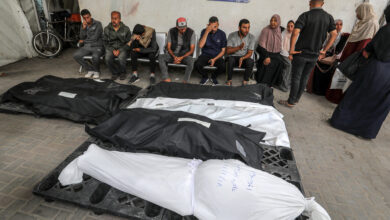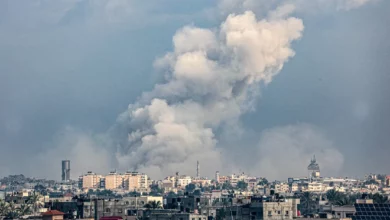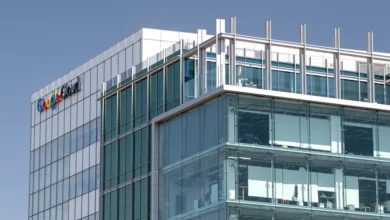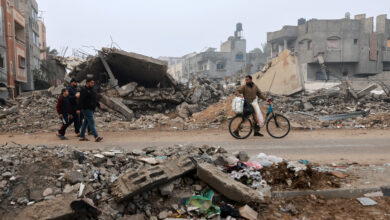Born in Los Angeles, California, in 1951, Charles Glass is a broadcaster, journalist and author of several books, who began his journalistic career in 1973 at the ABC News Beirut bureau. He covered the October 1973 War on the Egyptian and Syrian fronts and the civil war in Lebanon, where artillery fire wounded him in 1976. He was ABC News Chief Middle East from 1983 to 1993. In 1987, Glass himself was abducted and held hostage for two months before escaping from his Hizbollah captors. In 1988, he exposed Saddam Hussein’s then-secret biological weapons program. The U.S. government rejected Glass’s claims, until Iraq invaded Kuwait in 1990. For his reporting and investigative pieces, Glass has been honored by the Overseas Press Club and has shared Commonwealth and George Foster Peabody Awards.
Al-Masry Al-Youm: Despite your negative encounter with the resistance forces in the Middle East you still label yourself as an anti-Zionist, how come?
Charles Glass: Things happen. I might have been pro-Israeli and an Israeli soldier could have shot me by mistake. It doesn’t mean you change your mind about it. What happened to me: 1) was political not personal, 2) Something I don’t really bear a grudge about, 3) My reasons for criticizing Israel are more profound and very much pre-date the existence of Hizbollah. I don’t think Israel has the right to occupy the West Bank and Gaza or the Golan Heights under any international law or any other morality. Israel doesn’t have the right to expel Palestinians from their homes and build settlements. These things were all clear no matter what happened to me. So I don’t see why I’d change my mind.
Al-Masry: The Middle East has been a playground for empires, something which you tackle in your book.
Glass: The longer I stayed in Lebanon the more I grew fond the Ottoman empire. They kept the peace and there was a great deal of autonomy all throughout the region. When the autonomy got out of hand, they started fighting, like what happened in Lebanon.
Al-Masry: Your personal ordeal was connected to Lebanon and Iran, two countries which have just witnessed elections. What is your comment on the results of these elections?
Glass: The US exerted so much pressure on this (Lebanese elections). Joe Biden went to Lebanon and made it clear Lebanon was not going to enjoy the benefits and American money and so forth if they voted the wrong way, as the Palestinian did. That played a role. I think the importation of Lebanese expatriates played a role too. But by the same token, I was in Lebanon in 2006 during the Israeli invasion. People were a little tired of Hizbollah provoking Israel and making all of Lebanon pay the price. It was a political decision by Hizbollah, which impacted the whole of Lebanon. I think there was some genuine resentment with Hizbollah. The party’s MPs still won their seats, but the coalition overall did not do well.
Al-Masry: And Iran?
Glass: I was surprised. I thought the reformists would do better. It could have been rigged; I don’t know. The opposition didn’t get much access to the media as much as the president did before the elections. The result might be a bit skewed in their favor. But I haven’t been there since 2003, so I’m a little out of touch.
Q: There was some theory that Hizbollah did not want to win the elections in the first place so as not to be put in the same situation as Hamas. In other words they are happy to stay in the opposition.
Glass: That’s possible but I don’t know.
Al-Masry: How do you see Obama’s visit to Cairo?
Glass: The Egyptian regime is in America’s pocket. Obama’s visit enhanced Mubarak’s prestige. For the administration it was better to do it here (give the speech). But where else were they would have given it? He couldn’t have given it in Mecca, and certainly not Lebanon. And not in Jordan either, because it’s insignificant. Obama is a new salesman who is selling an old product.
Al-Masry: The Palestinian cause under Obama, do you think there will be any change?
Glass: I doubt it. I sincerely doubt it. I’d like to see change, but I doubt.
Q: Why?
Glass: What has he done? Apart from promising the $3 billion to Israel, which is what every other American president has done, what has Obama done? He said “I don’t want any more settlements.” Well, I can tell my son: “I don’t want you driving while you are drunk,” but if I don’t take away the car keys from him then he is going to die.
Al-Masry: You dedicated your book to Noam Chomsky and Edward Said, why?
Glass: These are two dear friends and two of the men I greatly admire for their wisdom. Q: But both are sidelined and criticized by the mainstream media. A: An additional reason to like them. If they were lionized by the New York Times then you know something is wrong.
Al-Masry: What’s your next project?
Glass: I have a book that just came out that’s titled, “Americans in Paris.” It’s about the Americans who stayed in Paris under the German occupation. I’m also writing a book now about the deserters in the armies of Europe during WW2. Q: That represents a departure from what you’ve been working on before. A: I needed change, A break away from the Middle East for a while.
Al-Masry: Some people say the two state solution is utopian, and the real practical solution.
Glass: I think it’s desirable to happen, but not necessarily what’s gonna happen. The Israelis don’t want either. Under the current political realities I don’t see the Israelis moving towards peace, they’ll have to be pushed by a strong US administration to do what they did on several situation before: Evacuate lands they occupied.




